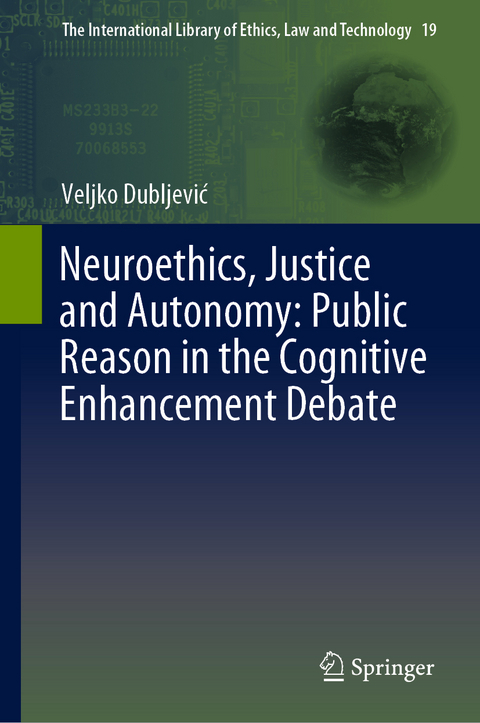
Neuroethics, Justice and Autonomy: Public Reason in the Cognitive Enhancement Debate
Springer International Publishing (Verlag)
978-3-030-13642-0 (ISBN)
This book explicitly addresses policy options in a democratic society regarding cognitive enhancement drugs and devices. The book offers an in-depth case by case analysis of existing and emerging cognitive neuroenhancement technologies and canvasses a distinct political neuroethics approach. The author provides an argument on the much debated issue of fairness of cognitive enhancement practices and tackles the tricky issue of how to respect preferences of citizens opposing and those preferring enhancement. The author persuasively argues the necessity of a laws and regulations regarding the use of cognitive enhancers. He also argues that the funds for those who seek cognitive enhancement should be allocated free of charge to the least advantaged. The work argues that the notion of autonomy has been mistakenly associated with the metaphysical concept of free will, and offers a political definition of autonomy to clarify how responsibility is implicitly grounded in the legal and political system. As such, this book is an essential read for everyone interested in neuroethics, and a valuable resource for policy makers, as well as scholars and students in philosophy, law, psychiatry and neuroscience.
Veljko Dubljevic Ph.D.,D.Phil., is an Assistant Professor of Philosophy and Science, Technology and Society at North Carolina State University. Before arriving in Raleigh, he spent three years as a postdoctoral fellow at the Neuroethics Research Unit at IRCM and McGill University in Montreal, Canada. He studied philosophy (University of Novi Sad) and economics (Educons University), and obtained a PhD in political science (University of Belgrade). After that he joined the Research Training Group "Bioethics" at the International Centre for Ethics in the Sciences and Humanities, University of Tuebingen, and after studying philosophy, bioethics, and neuroscience, he obtained a doctorate in philosophy (University of Stuttgart). Dr. Dubljevic's research focuses on ethics of neuroscience and technology, and neuroscience of ethics. He has over 50 publications in moral, legal and political philosophy and in neuroethics.
List of abbreviations.- Acknowledgments.- Abstract.- 1. Introduction.- 1.1. The political approach: Beyond utilitarianism and nonpublic reasons - public reason, autonomy and justice in neuroethics.- 1.2. The outcomes: Extension of Rawls' theory of justice in the practical account of public policy on cognitive enhancement.- 1.3. Research questions and the structure of the book.- 2. Conceptual and methodological foundations.- 2.1. Rawls' political philosophy.- 2.2. Principles of justice as criteria for assessing cognitive enhancement of healthy adults - perspectives and counterarguments.- 2.3. Coercion and compulsion: the political and not metaphysical principle of autonomy in neuroethics.- 3. Psycho-pharmacological cognitive enhancements.- 3.1. Cognition-enhancement drugs: General issues.- 3.2. The case of Ritalin (Methylphenidate).- 3.3. The case of Adderall (Amphetamine).- 4. Electro-magnetic enhancements of cognition.- 4.1. Cognition-enhancement devices: General issues.- 4.2. Thecase of transcranial direct current stimulation (tDCS).- 4.3. The case of transcranial magnetic stimulation (TMS).- 5. Analysis of objections.- 5.1. Objections to the general approach.- 5.2. Could there be a convergence between liberals, socialists and conservatives on policy concerning cognitive enhancement? Objections to the idea of public reason.- 5.3. Specific objections to the argument and policy proposals.- 6. Conclusions.- Index.
| Erscheinungsdatum | 10.05.2019 |
|---|---|
| Reihe/Serie | The International Library of Ethics, Law and Technology |
| Zusatzinfo | XV, 138 p. 1 illus. |
| Verlagsort | Cham |
| Sprache | englisch |
| Maße | 155 x 235 mm |
| Gewicht | 403 g |
| Themenwelt | Geisteswissenschaften ► Philosophie ► Allgemeines / Lexika |
| Geisteswissenschaften ► Philosophie ► Ethik | |
| Naturwissenschaften ► Biologie ► Humanbiologie | |
| Naturwissenschaften ► Biologie ► Zoologie | |
| Wirtschaft ► Volkswirtschaftslehre ► Wirtschaftspolitik | |
| Schlagworte | Coercion and compulsion • Cognition-enhancement devices • Cognitive Enhancement • cognitive enhancements • Electro-magnetic enhancements of cognition • enhancement in neuroethics • neuroenhancement of human beings • Neuroethics • neuroscience interventions • Political Philosophy • psycho-pharmacological cognitive enhancements • Quality Control, Reliability, Safety and Risk • Rawl's theory of justice • Transcranial direct current stimulation • Transcranial magnetic stimulation • Utilitarianism |
| ISBN-10 | 3-030-13642-6 / 3030136426 |
| ISBN-13 | 978-3-030-13642-0 / 9783030136420 |
| Zustand | Neuware |
| Haben Sie eine Frage zum Produkt? |
aus dem Bereich


